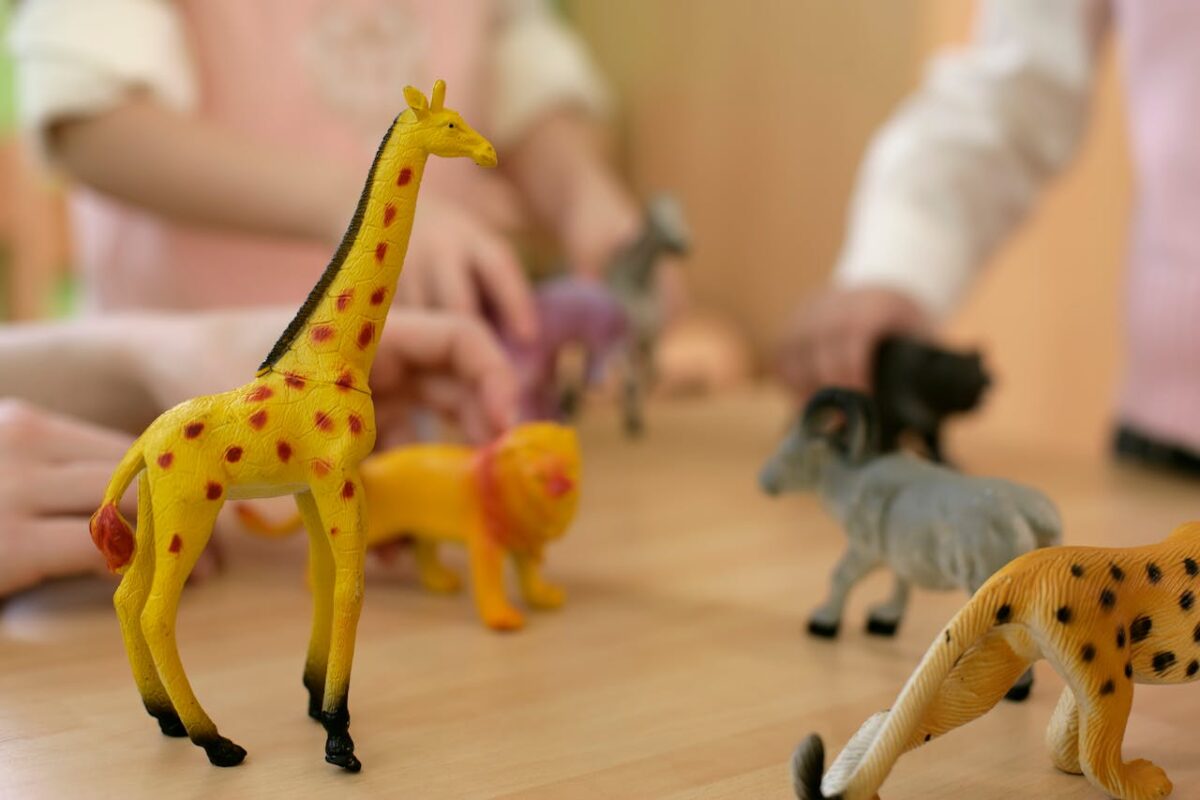Key points to remember:
- Small toy animals have the potential to improve children’s motor skills and cognitive development while also boosting their skills.
- They offer benefits by engaging in play and storytelling.
- Playing with animal toys can help children develop empathy and a better understanding of the environment.
Improving Physical Coordination
Small toy animals in a collection of mini toys can be beneficial for developing the motor skills of toddlers and young children by enhancing hand eye coordination and dexterity through activities, like sorting them by type or color and placing them into designated boxes based on their species to practice precise finger movements and coordination skills. Engaging in this type of activity also helps improve hand strength needed for tasks, like writing and dressing oneself by fastening buttons.
Enhancing Growth
Playing with animal figurines can help kids improve their thinking skills in a way by identifying various animals and learning about where they live and basic biology concepts too. Experts suggest that early exposure to a variety of learning experiences can really boost a childs brainpower. Creating scenes or miniature ecosystems can help kids grasp concepts, about the world in an enjoyable manner! For instance, a parent or teacher may create a jungle or farm setting. Request the child to position the animals in their correct habitats. This task helps develop abilities and improves memory while also honing object categorization skills.
Enhancing Interpersonal Abilities
Engaging in play with animal figurines frequently includes role playing situations with kids or adults caretakers alike. These scenarios can assist children in honing abilities like collaboration, compromise and understanding. For instance kids could alternate selecting animal figures to include in a forest scene thus grasping the value of teamwork. Such playtime often demands that children express their thoughts and pay attention to others, which is essential, for building skills. Furthermore playing together with these toys can help nurture relationships and educate children on cooperating towards shared objectives. Whether it involves constructing a zoo or organizing an animal rescue operation these joint endeavors enhance skills in teamwork.
Encouraging Play
Kids enjoy building their make believe worlds where tiny animal figurines take on roles in scenarios that help develop problem solving skills as pointed out in Psychology Today research findings on the importance of imaginative play, for mental development and growth, in children. Engaging in this kind of make believe play frequently demands children to analyze situations and devise answers. A practice that could enhance their problem solving abilities in scenarios.
Opportunities For Storytelling
These playthings serve as aids for sparking imagination and creativity in kids through storytelling adventures with animal characters that foster language skills and vocabulary expansion.The act of storytelling plays a role in enhancing childrens abilities by improving their ability to express thoughts and concepts effectively.Playing out stories using these toys can be enjoyed alone or, with friends or family members as a way for kids to express their narratives to others. A child could describe a day in the life of their animal friend by sharing information, about its behaviors and surroundings This activity can enhance language skills and improve the ability to organize a story by grasping its introduction, development and conclusion.
Fostering Understanding
When kids engage in pretend play with their toy animals they can develop compassion and empathy by taking care of them It’s like practicing how to be kind and understanding, towards others Kids learn to show care by feeding or comforting their toy animals which can remind us how we treat our pets or friends Talking about the feelings and actions of these toy animals can help us talk about emotions and understand ourselves better. For instance. A kid could describe why their stuffed needs to take a nap by relating it to why they themselves need a break too; engaging in such pretend play situations can really help a child grasp and empathize with others emotions better.
Raising Awareness about the Environment
Playing with animal figurines can help kids learn about habitats and why its important to protect nature in general settings, like forests and oceans! Teachers often use these toys to talk about topics and encourage young ones to care for the Earth from an early age. For example; creating a rainforest scene can kickstart discussions on deforestation. How we can protect animals in danger. Teaching children about global environmental issues while having fun! When children explore the homes and needs of creatures through playtime with these toys they can grow a love, for nature and see how our actions impact the environment around us. Moreover this consciousness could serve as a starting point, for adopting friendly habits as individuals mature encouraging a lasting admiration and reverence, for the natural world.




